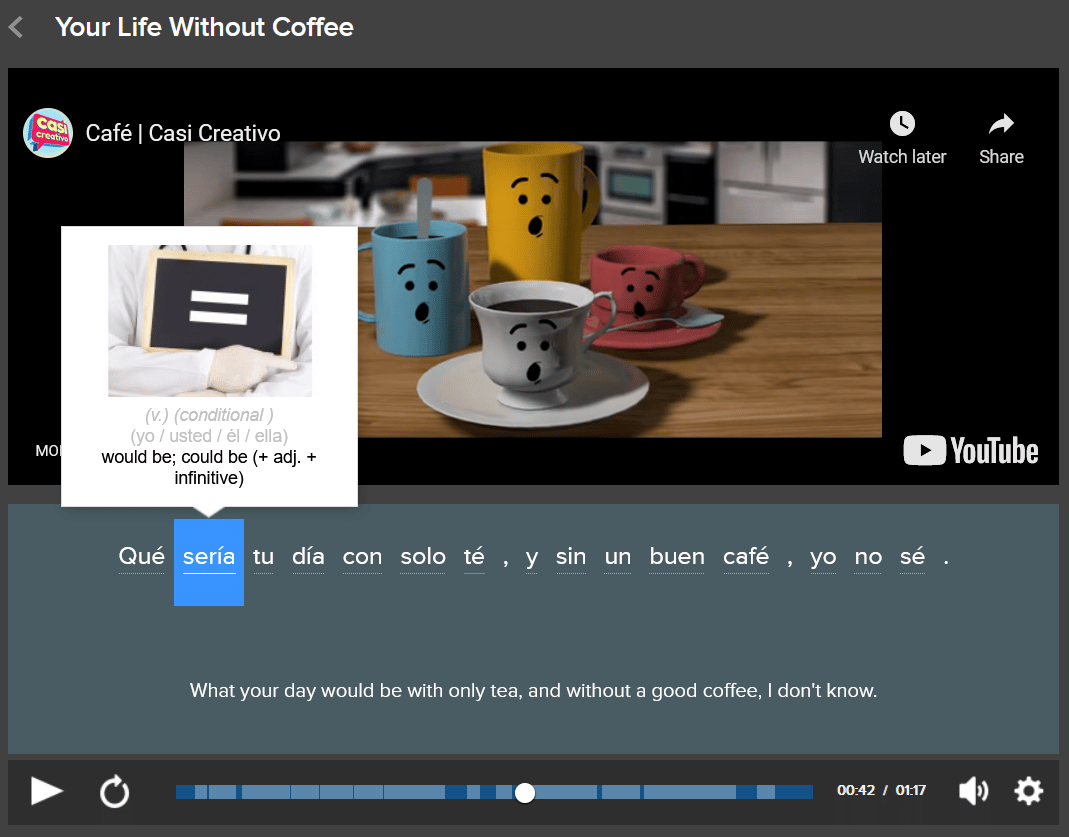
Tired of having the same old basic “getting to know you” chats?
If you’re already able to comfortably chat away about where you’re from, what you do and how long you’ve been learning to speak Spanish, then it won’t take much to turn an average conversation into something more exciting.
So, skip over “¿de dónde eres?” and follow these tips to pave your way toward amazingly advanced Spanish conversation.
Contents
Download:
This blog post is available as a convenient and portable PDF that you
can take anywhere.
Click here to get a copy. (Download)
Conversation Topics for Advanced Spanish Conversation
It’s a good idea to have a few conversation topics up your sleeve in case of any awkward gaps in conversation, or in those moments where all your Spanish suddenly flies out of your head and you’re left tongue-tied.
Try memorizing a couple of expressions and questions you find interesting, and you should be able to talk your way out of any sticky situation.
Music Terms, Expressions and Questions

Music is something almost everyone has an opinion on and can tell you a lot about your conversation partner.
Useful vocabulary terms about music include:
el disco entero — the whole album
el recital — the gig
el estribillo — the chorus
la estrofa — the verse
pegajoso — catchy
el éxito — the hit
grandes éxitos — greatest hits
You could say:
El estribillo es muy pegajoso pero la estrofa es medio aburrida. Igual, definitivamente es el éxito del verano.
(The chorus is really catchy but the verse is a bit boring. Anyway, it’s definitely the hit of the summer.)
Useful questions about music you might like to ask are:
Si pudieras formar un súper grupo, ¿quién formaría parte de él?
(If you could form a supergroup, who would be in it?)
¿Cuál es el mejor recital al que has ido?
(What’s the best gig you’ve ever been to?)
¿Cuál fue el primer disco que compraste?
(What was the first album you ever bought?)
¿Tocas un instrumento?
(Do you play a musical instrument?)
¿Qué instrumento te gustaría aprender?
(What instrument would you like to learn to play?)
Travel Terms, Expressions and Questions

Travel is another safe area that usually gets tongues wagging. A conversation about travel can also naturally lead to talking about local customs, celebrations and food.
Useful vocabulary terms about travel:
viajar te abre la mente — traveling opens your mind
un lugar inspirador — an inspirational place
hacer dedo — to hitchhike
ir de mochilero — to go backpacking
un lugar de lujo — a luxury place
Useful questions about travel:
¿Cuál es el lugar más hermoso/interesante que has visitado?
(What’s the most beautiful/interesting place you’ve ever been to?)
¿Cuál es la mejor/peor experiencia que has tenido mientras estabas viajando?
(What’s the worst/best travel experience you’ve ever had while traveling?)
¿Preferirías pasar mucho tiempo en un lugar, o poco tiempo en muchos lugares?
(Would you rather spend a long time in one place, or spend a little time in lots of places?)
¿A qué lugar de tu país me recomendarías ir?
(Which part of your country would you recommend I go to?)
Entertainment Terms, Expressions and Questions

If all else fails, conversation revolving around TV, film, theater and books could be a good way to engage your partner.
Useful vocabulary terms about entertainment:
el elenco — cast
la banda sonora — soundtrack
la trama — the plot
el/la protagonista — the main character
For example:
No solo me gusta la trama de esta película, sino que también me encanta la banda sonora y el elenco es muy talentoso.
(I don’t just like the plot of this film, but I also love the soundtrack and the cast is very talented.)
Useful questions about entertainment:
¿Qué película te gustaba mucho cuando eras niño/niña?
(What film did you love as a kid?)
¿Cuál es tu programa preferido en la tele actualmente?
(What’s your favorite show on TV at the moment?)
¿Preferirías ser (elige un personaje de ficción) o (elige un personaje de ficción)?
(Would you rather be (insert fictional character) or (insert fictional character)?)
Si fueras (elige un personaje ficticio) ¿qué hubieras hecho cuando (elige una situación ficticia)?
(If you were (insert fictional character) what would you have done when (insert fictional situation)?)
Polite Ways to Agree and Disagree in Spanish
I’m a firm believer that the best conversation involves some sort of debate or disagreement.
If you agree with your conversation partner all the time, on everything, then things can get a little dull.
Saying that, when you do disagree with someone, be sure to choose your words carefully or you could end up offending someone. To help things along, here’s a list of how to agree, disagree and partially agree in Spanish. And for when you really get stuck, you’ll also get some expressions to say you don’t know:
Agreeing politely
¡Totalmente! — Totally!
Estoy (completamente/totalmente) de acuerdo — I (completely/totally) agree
Estoy contigo — I’m with you on that
Por supuesto — Of course!
Tienes razón — You’re right
Disagreeing politely
No estoy de acuerdo — I don’t agree with you
No lo veo (tan) así — I don’t (really) see it like that
No creo — I don’t think so
Saying you’re unsure or showing partial agreement
Estoy de acuerdo hasta cierto punto — I agree with you up to a point
Tal vez, pero… — Maybe, but…
No estoy muy seguro/segura — I’m not really sure
Nunca lo había pensado — I’ve never thought about it
No tengo la menor idea — I have no idea
Using the Conditional Tense in Advanced Spanish Conversation
Conditionals may be in the realm of grammar, but brushing up on them opens up thousands of new possible conversation doors, or windows if you prefer.
Remember when you learned the past tense and were suddenly able to discuss a whole new dimension of things? Suddenly you could talk about anything you’d done previously, which is a lot.
Well, getting to grips with conditionals and learning to use them in conversation is similar.
Adding “ifs” into your conversation allows you to talk about an imaginary world of hypotheticals, which is incredibly useful for having an interesting conversation that isn’t firmly stuck in the present. Perhaps you don’t like your current job, and if you had just a bit more experience – si tuvieras un poco más de experiencia – you would change it – lo cambiarías.
That’s much more satisfying than just saying you don’t like it, right?
Conditionals are also one of the points that many advanced Spanish learners struggle with. You have three options to learn them: you could sit at home and study a grammar book, you could try them out as you chat or you can listen to them used by native Spanish speakers.
One of the best ways to learn Spanish conditionals, terms and expressions is by immersing yourself in native media. There are many different ways to consume native media, from Spanish TV shows on Netflix to language learning programs like FluentU for extra learning support.
FluentU uses authentic bite-sized Spanish videos like movie trailers and inspiring talks to help immerse you in the language. Each video is equipped with subtitles, from which you can find out more information about conditionals by clicking or hovering over the word.

FluentU is available to access on your browser or by downloading the iOS or Android app.
By consuming native Spanish content, you’ll be able to identify and memorize conditionals as well as key terms and expressions used by native speakers and start using them in your own conversations!
In the meantime, here are a few fun and imaginative conditional questions to start using in your Spanish conversations:
Si pudieras ser una persona famosa por un día, ¿a quién elegirías?
(If you could be a famous person for one day, who would you choose to be?)
Si tuvieras un millón de dólares, ¿qué harías?
(If you had a million dollars, what would you do?)
Si pudieras viajar a cualquier lugar en el mundo, ¿a dónde irías?
(If you could travel anywhere in the world, where would you go?)
Si fueras presidente, ¿qué cambiarías?
(If you were the president, what would you change?)
You’ve got what you need for some seriously advanced conversation, so now it’s time to put everything into practice!
Let native speakers guide you, and listen to them using these expressions through authentic Spanish resources like podcasts and TV shows.
However you practice, just make sure that you do. Then you can find yourself a partner and be off!
Download:
This blog post is available as a convenient and portable PDF that you
can take anywhere.
Click here to get a copy. (Download)



